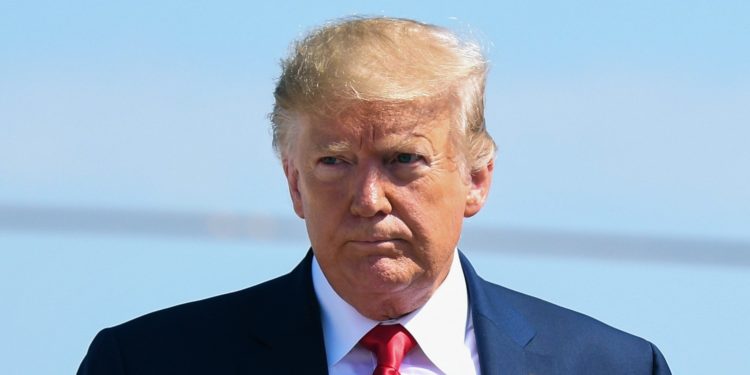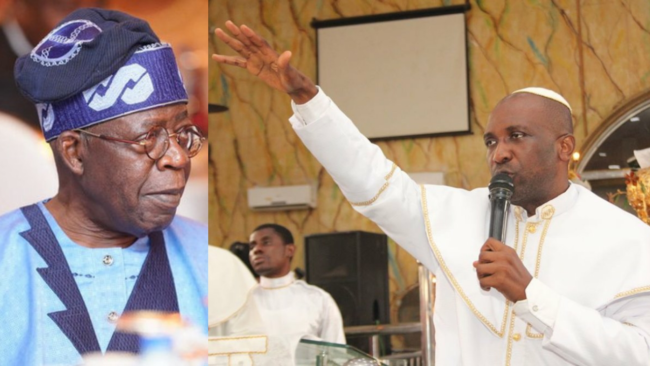Headline
Japa: Nigerians Shun Travel To US Over Trump’s Immigration Policies

Trump’s immigration policies have discouraged many Nigerians from traveling to the United States.
Many people who were considering the US as a destination for higher education have reconsidered, leading to a reduction in the number of people applying for US visas.
Speaking to The PUNCH, about the matter, the Chief Executive Officer of a travel consultancy firm, Cardinal E-School and Edu Services, Sulaimon Okewole, said Trump’s executive orders had negatively impacted travel activities to the US.
He noted that prospective international students from Nigeria were exploring alternative destinations due to uncertainty and fear about studying in the US.
READ ALSO: Deportation: Trump Administration Revokes Protected Status For Venezuelans
Okewole stated, “Political stability is now a key consideration, alongside economic stability when choosing a study abroad destination.
“The US is going to experience a decline in international student enrollment, and addressing these concerns is crucial to regaining its position as a premier destination for international students.”
A representative of Renpha Consulting, another education consulting firm, Choice Ukpe, stated that obtaining a US visa was already difficult under normal circumstances.
Ukpe added that the executive orders would make it even harder for Nigerians seeking opportunities in the country.
READ ALSO: US-based Nigerians Go Into Hiding Amid Trump’s Deportation Crackdown
She said, “It will be very difficult for Nigerians to study in the country now as they will tighten requirements and all. Schools in the US offer scholarships to encourage international students, but this still doesn’t guarantee a visa.
“What we’re doing here now is finding alternatives for our clients. Just like when the United Kingdom introduced a policy on dependents, we looked for other options.”
A student seeking admission to the US, Wale Dada, expressed sadness over the matter, stating that it was already affecting him.
He added that he had been planning to start a Master’s degree programme in the US this year.
READ ALSO: We Will Reciprocate If Trump Hikes Tariffs – Brazilian President
Dada said, “With what I have heard about the orders, I do not think I will proceed with the preparations. I cannot afford to leave the country only to get there and be rejected or treated like a criminal. I believe this order will severely impact my plans and those of many people like me.”
Another prospective international student, Abdulateef Oriyomi, noted that Trump’s executive orders had deterred his plans to study in the US.
Oriyomi said, “I was already seeking admission and exploring various options, hoping to begin my academic journey at one of the prestigious institutions in the US. Unfortunately, with the recent policy, that aspiration now feels almost unattainable.”
(PUNCH)
Headline
PROPHECY: Primate Ayodele Reveals Trump’s Plot Against Tinubu

Primate Ayodele and Tinubu, Tinubu’s rice palliative, Primate Ayodele to Tinubu
Tinubu and Primate Ayodele
The leader of INRI Evangelical Spiritual Church, Primate Elijah Ayodele, has warned President Bola Ahmed Tinubu that US President Donald Trump is after removing him from office.
This comes amid the removal of Vanezuelan President Nicolás Maduro by Donald Trump.
Primate Ayodele, in a statement signed Sunday by his media aide, Osho Oluwatosin, made it known that the US President has ‘caged’ Tinubu and his plan is to ultimately see that he is removed from office.
READ ALSO:Primate Ayodele Releases Fresh Prophecies On FIRS, FAAN, Others
He stated that the support the US is giving Nigeria to fight insecurity isn’t for nothing other than ways to penetrate the government.
“Trump is adamant to remove President Tinubu. America will be part of those who will be against Tinubu. You may not see it as I am being shown, and that’s why I am saying Trump is after removing Tinubu, that’s it and nothing more.”
The cleric made it known that, despite US’ help, Nigeria will continue to fight insecurity, but the ulterior motive of the US President isn’t about ending insecurity in the country.
READ ALSO:Guber Polls: Primate Ayodele Releases Prophecies On Anambra, Ekiti, Osun
“Nigeria will still continue to fight insecurity, but either they fight it or not, Trump is focused on removing Tinubu from office, but he doesn’t know it yet. He isn’t after ending insecurity in the country, he knows what he wants and won’t stop at nothing towards achieving it.”
He urged the president to take a bold political step to overcome the plans of the US president; otherwise, he will end up succeeding with his plans.
“Tinubu must take a very bold step to overcome the plans of Trump, because he has caged him already. Tinubu must not relent his efforts and bring up strategies for him to succeed otherwise, he would be at the losing end while his defeat would be celebrated,” he added.
Headline
JAPA: Top Six Countries To Obtain Easiest Citizenship

As a Nigerian considering relocation plans, interest in countries with clear and less complicated citizenship pathways is a smart way to not just guarantee greener pastures, but also provide you with the opportunity to feel more at home in a foreign land. While some of the programmes are ancestry-based, others allow Nigerians with such a link to try other means.
Contents
1. Dominica
2. Ireland
3. Turkey
4. Portugal
5. Vanuatu
6. Italy
Though rules vary widely across borders, some nations stand out for offering citizenship through investment or family ties with fewer hurdles and faster processing timelines.
Below are the top six countries with the easiest citizenship:
1. Dominica
Dominica operates a citizenship-by-investment programme that allows applicants to qualify through a contribution to the government’s Economic Diversification Fund or by investing in approved real estate. Processing typically takes a few months. Citizens enjoy visa-free or visa-on-arrival access to over 140 countries, including the Schengen Zone. There is no residency requirement, and dual citizenship is permitted.
READ ALSO:Japa: 5 Affordable European Countries Nigerians Can Relocate To
2. Ireland
Ireland provides a clear citizenship pathway for individuals with Irish ancestry. Those with an Irish-born parent qualify automatically, while people with an Irish-born grandparent can apply through the Foreign Births Register. An Irish passport grants full European Union rights, including freedom of movement across EU countries. Dual citizenship is allowed, and there is no language requirement for applicants applying by descent.
3. Turkey
Turkey offers a fast-track citizenship option through investment. Foreign nationals who purchase qualifying real estate valued at a minimum of $400,000 can obtain citizenship within a few months. The programme does not require residency or renunciation of an existing nationality. Turkish passport holders have visa-free or visa-on-arrival access to several countries, with ongoing efforts to expand travel agreements.
4. Portugal
Portugal’s Golden Visa programme provides a residency-to-citizenship route for foreign investors. After five years of legal residence and meeting programme conditions, applicants may apply for citizenship. Approved investment options include venture capital funds and other qualifying assets. Successful applicants gain an EU passport, access to the Schengen Area, and dual citizenship, subject to passing a basic Portuguese language test.
READ ALSO:Japa: Lagos Suffers Deficit Of 30,000 Doctors, Commissioner Laments
5. Vanuatu
Vanuatu runs one of the world’s fastest citizenship programmes. Through its Development Support Programme, eligible applicants can receive citizenship in as little as two months after making the required financial contribution. The country offers visa-free access to over 100 destinations and has no tax on global income or capital gains. Residency requirements are minimal.
6. Italy
Italy grants citizenship by descent to individuals with an Italian parent or grandparent, following a 2025 legal update that tightened eligibility rules. Applicants must provide official documents proving a direct family link to an Italian ancestor. Italian citizenship comes with full EU rights, wide visa-free travel, and the ability to pass citizenship to future generations. Dual nationality is allowed, and no language test is required for descent-based applications.
(Tribune)
Headline
Japa: 5 Affordable European Countries Nigerians Can Relocate To

As economic pressures continue to mount, many Nigerians are increasingly exploring relocation as a path toward stability, better opportunities, and an improved quality of life. However, traditional destinations such as the United Kingdom, Canada, and the United States are becoming more difficult to access due to rising living costs and stricter visa policies.
Contents
1. Slovakia
2. Latvia
3. Portugal
4. Hungary
5. Georgia
But beyond these popular options, several lesser-known European countries are emerging as affordable and welcoming alternatives. Offering low tuition fees, flexible visa policies, and a reasonable cost of living, these nations are becoming attractive relocation choices for Nigerians seeking balance and opportunity.
In this article, Tribune Online highlights five budget-friendly countries Nigerians can consider for relocation:
1. Slovakia
Located in Central Europe, Slovakia combines stability, safety, and simplicity; three factors often missing in high-pressure relocation destinations.
READ ALSO:Top 11 Friendliest Countries To Visit
Though it may not feature prominently on social media relocation lists, Slovakia’s affordability and accessibility make it a hidden gem. Students enjoy low tuition fees, while residents benefit from proximity to major European cities like Vienna and Prague. For Nigerians seeking structure and affordability, Slovakia provides a peaceful yet practical alternative.
2. Latvia
The Baltic nation of Latvia is fast becoming a preferred destination for international students and skilled professionals. Known for its low living costs and straightforward residence procedures, Latvia offers a convenient entry point into the European Union.
Riga, its capital city, blends historic charm with modern infrastructure, providing an ideal environment for studying, working, or gradually transitioning to other parts of Europe.
3. Portugal
Situated on Europe’s western coast, Portugal is one of the continent’s most liveable and affordable countries. Known for its mild weather, safety, and reasonable living costs, Portugal offers a soft landing for Nigerians looking to relocate without excessive financial strain. The country’s friendly visa policies and welcoming atmosphere make it ideal for students, remote workers, and small business owners. Beyond its scenic beauty, Portugal provides what many Nigerians desire: peace of mind and an easier start abroad.
READ ALSO:10 Countries With The Strongest Global Reputation In 2025
4. Hungary
Hungary has quietly become a top choice for international students, offering quality education at affordable tuition rates. Living costs are significantly lower than in Western Europe, and cities like Budapest, Szeged, and Debrecen provide vibrant yet budget-friendly environments.
For Nigerians looking to relocate through education, Hungary offers a realistic and sustainable path toward long-term settlement in Europe.
5. Georgia
For Nigerians seeking an easy transition abroad, Georgia presents one of the smoothest relocation routes. The country allows Nigerians to stay visa-free for up to one year, eliminating embassy interviews and lengthy paperwork.
Located between Europe and Asia, Georgia offers a blend of natural beauty and affordability. Rent, transport, and food costs remain moderate, making it an excellent base for digital nomads and young professionals.
As migration trends evolve, success now depends on flexibility and strategic planning. While the dream of relocating abroad remains strong, the path doesn’t always have to lead through the UK or Canada. For Nigerians ready to look beyond the familiar, Europe’s quieter corners still offer accessible and rewarding opportunities.

 Headline13 hours ago
Headline13 hours agoPROPHECY: Primate Ayodele Reveals Trump’s Plot Against Tinubu

 News13 hours ago
News13 hours agoWhat I Saw After A Lady Undressed Herself — Pastor Adeboye

 Metro15 hours ago
Metro15 hours agoJoint Task Force Kills 23 Bandits Fleeing Kano After Attacks

 Politics15 hours ago
Politics15 hours agoWhy Kano Governor Postponed Formal Defection To APC

 Metro12 hours ago
Metro12 hours agoArmed Robbers Shot PoS Operator To Death In Edo

 Politics13 hours ago
Politics13 hours ago2027: Rivers APC Pledges To Follow Wike’s Instructions

 Metro13 hours ago
Metro13 hours agoGunmen Demand N200m Ransom For Kidnapped Brothers In Edo

 News13 hours ago
News13 hours agoReps Release Four Tax Acts For Public Records

 Entertainment13 hours ago
Entertainment13 hours agoAnthony Joshua Returns To UK In Private Jet

 News15 hours ago
News15 hours agoNiMet Forecasts Three-day Dust Haze, Sunshine




























